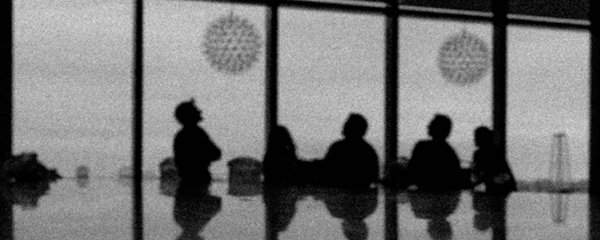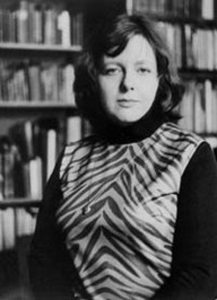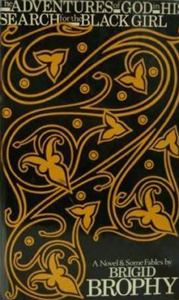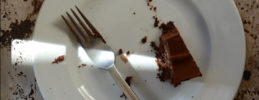
(‘The Philosophers’ © paolobarzman, 2012)
BRIGID BROPHY IN ELYSIUM
by MICHAEL CAINES
What are the dead if not talkative? There they are, chatting away, illustrious or not: an unnamed theologian – ‘One doesn’t contemplate hell for fun’; an unnamed psychoanalyst – ‘Pitter-patter, pitter-patter…’; illustrious types such as Voltaire – ‘Fiction is not so simple an affair as amateurs assume’ – and George Bernard Shaw – ‘The author… is a mere instrument in the grip of Creative Evolution, and may find himself starting a movement to which in his own little person he is intensely opposed’; even a humble Christian – ‘Divine justice is a mystery. Man is too puny to scrutinise God’. Then, along comes somebody who has been eavesdropping, but has hesitated to intervene: God. ‘You’re all historical characters, whereas I’m a fictitious one. As such, I have of course my own validity, but there are certain anomalies peculiar to my situation which make me feel vulnerable…’
Vulnerable? Lord, you don’t know the half of it. For here I am, commending an immaculately conceived work of fiction called, as it happens, The Adventures of God in His Search for the Black Girl. Its author: the phenomenon known as Brigid Brophy. Until recently, I considered this book merely to be a collection of short stories – although ‘short’ in this context covers everything from a story that is a single sentence in length, to one about that posthumous symposium, from which the book takes its title. Were Brophy more in fashion today, however, more often discussed and celebrated in the media and online, more easily available in print, I might have known that, as the dust jacket of the first edition only has it, The Adventures of God in His Search for the Black Girl actually consists of ‘A Novel & Some Fables’. (The book is now available after a manner of speaking, as a Faber Find, but the pragmatic uniformity of those print-on-demand editions precludes the reproduction of that crucial, presumably authorial, description.)
So am I talking about a short story collection here or not? These are most definitely stories, and most of them seem short to me, as these things go – how short is a piece of string? They are gleeful little tales, succinctly playing on diverse genres: the most twee of fairy tales is made over in the first ‘fable’, ‘The Singularly Ugly Princess’; the second, ‘A Literary History’, which proposes the footnoted thesis that Ambrose Bierce removed to Argentina and reinvented himself as another learned and ludic B-surnamed writer in the twentieth century; the detective story is dispatched in a ‘Classic Detective Story’ populated by Lord Stock, Mrs Aspic, Archbishop Hide and so on. And so on with The Adventures, too. Small though they are, they add up to something mighty, in that each is imbued with Brophy’s trenchant wit and opinionated idiosyncrasies (she crusaded excellently in various causes). They do form a collection, yes, culminating in that long title story – the ‘novel’ in which ugly princesses and silent detectives are set aside, but the intrigue continues.
 Born in 1929 to a novelist father and an American mother, Brophy was a classicist who had the sense to be sent down from Oxford and to take her literary cues from writers such as George Bernard Shaw and Evelyn Waugh, Jane Austen and Ronald Firbank. These influences made themselves felt, transmuted as they were in novels such as her debut, Hackenfeller’s Ape, a sharply moral fable about humans and their treatment of other animals, Flesh, a gender-swapped reworking of Shaw’s Pygmalion, and The Finishing Touch, a Firbankian send-up of Anthony Blunt as the prying lesbian headmistress of a finishing school on the French Riviera. In the 1960s, Brophy wrote swingeing essays about politics, society, gender, obscenity, vivisection, vegetarianism and Kingsley Amis’ not-so-Lucky Jim. She appeared on television, talking about the evils of matrimony, while cheerfully conceding that she herself was happy in her own marriage to Michael Levey, a senior fellow at the National Gallery. She had a passion for classical music (especially Mozart), and for the rights of authors as well as other creatures, devoting her energies in later years to the campaign for Public Lending Rights. She was diagnosed with multiple sclerosis in the early 1980s, and died in 1995.
Born in 1929 to a novelist father and an American mother, Brophy was a classicist who had the sense to be sent down from Oxford and to take her literary cues from writers such as George Bernard Shaw and Evelyn Waugh, Jane Austen and Ronald Firbank. These influences made themselves felt, transmuted as they were in novels such as her debut, Hackenfeller’s Ape, a sharply moral fable about humans and their treatment of other animals, Flesh, a gender-swapped reworking of Shaw’s Pygmalion, and The Finishing Touch, a Firbankian send-up of Anthony Blunt as the prying lesbian headmistress of a finishing school on the French Riviera. In the 1960s, Brophy wrote swingeing essays about politics, society, gender, obscenity, vivisection, vegetarianism and Kingsley Amis’ not-so-Lucky Jim. She appeared on television, talking about the evils of matrimony, while cheerfully conceding that she herself was happy in her own marriage to Michael Levey, a senior fellow at the National Gallery. She had a passion for classical music (especially Mozart), and for the rights of authors as well as other creatures, devoting her energies in later years to the campaign for Public Lending Rights. She was diagnosed with multiple sclerosis in the early 1980s, and died in 1995.
Brophy’s CV may be seen in the contents page of The Adventures, in titles such as ‘Variations on Themes of Elgar and Brahms’ or ‘Democracy’, and beyond. The characteristic Brophy concerns are present and correct – how humankind uses and abuses its fellow animals and the environment, for example. One story, ‘Homo Sapiens’, begins ‘The great lake is dead’. Another, ‘Documentary’, starts out in a conventional, informative style:
Do you ever take time out to reflect, before you fall asleep in the warmth and safety which we call “home”, that there are those for whom the coming of night spells not the end but the beginning of toil?
Those night-workers turn out to be a ‘motley crew’, ranging from the ‘killer shark, always alert to swoop on the unwary bather or skin-diver’ to the ‘brave little shoals of mackerel’. And their industry, involving the catching and processing of livestock, is not without difficulties: ‘With modern intensive methods, say some conservationists, our seas are being over-humaned and there is a danger that the supply of men will be exhausted.’
Not to worry, though: ‘Human-farming … is just round the corner’. And there are ‘certain picturesque manning villages’ where the ‘mannerfolk’ still gather to ‘give thanks to Cod, who filled the surface of the sea with humans’. The joke is deliberately laboured and it has to end with a faux-jolly exclamation mark, or two: ‘Our thoughts go with you, gallant manner-folk! Happy manning!’
Subtlety is not the main object here. Instead, The Adventures is a fabular toy shop, a halfway house between Brophy the swingeing essayist – who was once dismissed by Ian Hamilton as ‘one of our leading literary shrews’ – and the ironic, baroque, satirical Brophy of the novels. Each story is a square strike at a nail, sometimes – ‘and stay down!’ – the same nail. By no means did Brophy always write with such blunted force. Her novel Flesh, for one, puts on realist airs, while In Transit has language undergo a Joycean trial by pun, perfect for its theme. The aim here was apparently to hit nails hard – as in ‘The Hypocrite Saga [A Family Chronicle]’, which pitches the lives of the rich and the poor against one another, to direct, gruelling effect.
Non-fiction and fiction were not, for Brophy, separate activities, as this collection demonstrates. Both Hackenfeller’s Ape and its successor, The King of a Rainy Country, drew on Mozart for theme and structure, with the latter falling into three parts, as in sonata form; Brophy saw in Mozart the kind of formal dynamism suggested by the title of her non-fiction book Mozart the Dramatist. Those furious fables in defence of animals likewise correspond to Brophy’s seminal essay ‘The Rights of Animals’, published in the Sunday Times in 1965. She is one of those figures known fragmentarily, to disparate groups: it is from animal rights activities that one takes the word ‘seminal’; from musicologists that one learns that one ought to be wary about Mozart the Dramatist; and from the novelists Philip Hensher and Jonathan Gibbs that one learns Flesh is an ‘undiscovered classic’.
Within the collection itself, the connections may be thematic, but pace matters as well. Those variations in length, from the relatively long down to the single sentence, and genre offer the basic entertainment value of continuous diversion: they are intellectual divertimenti. A proto-flash-fiction exercise set in Bluebeard’s castle faces a story beginning with two hapless emperors who meet at a ‘large inflated plastic dolphin a quarter of a mile out to sea’. ‘Three wishes?’, a little girl asks a ‘djinnee’ at the start of the barely-three-page ‘Wishes’, setting up another familiar fictional situation. That gives way to ‘The Woodcutter’s Upright Son’. What collection of fables or fairy tales would be complete without such a vertically virtuous fellow and his wood-cutting father?
 Finally, from its Shavian title onwards, ‘The Adventures of God in His Search for the Black Girl’ gives virtuoso voice to the figures excluded by convention from charmed settings, such as deer-haunted forests and the pastoral Golden Age. Instead, it recalls and intensifies that alternative strain running through the book, by which a sage illustrates political and philosophical paradoxes to his pupils, and Brahms discusses Elgar on Mount Parnassus with the muse Polyhymnia. Here, you reach the back of the toy shop where the wooden puppets are kept. This dialogue of the dead commences with Voltaire repeating himself – ‘if God did not exist, it would be necessary to invent him’ – and a psychoanalyst answering. Others join in, storm off in a funk, fall asleep and shift ground (musically, thematically and geographically). Plot gives way to talk – or rather, talk is the plot. Not everybody deigns to join in: Lucian is spotted, ‘a lithe Grecian figure’ vanishing, ‘silvery as a lizard’, behind the ‘plinth of a Pan’. The humble Christian is ludicrous and ludicrously persistent. ‘You’re forever on about animals’, he complains of a God who shares a suspicious number of concerns with a certain notorious vegetarian polemicist. “Should you be surprised?” God asks. “Surely you believe that a sparrow does not fall on the ground without my taking note of it?” “I daresay God can cite Scripture for his purpose,” the Christian ‘sulkily’ replies. Everybody has their story to tell, or a fable to tell, at least, here in the Elysian Fields. And by each fable, more importantly – or more importantly in this context – hangs a moral.
Finally, from its Shavian title onwards, ‘The Adventures of God in His Search for the Black Girl’ gives virtuoso voice to the figures excluded by convention from charmed settings, such as deer-haunted forests and the pastoral Golden Age. Instead, it recalls and intensifies that alternative strain running through the book, by which a sage illustrates political and philosophical paradoxes to his pupils, and Brahms discusses Elgar on Mount Parnassus with the muse Polyhymnia. Here, you reach the back of the toy shop where the wooden puppets are kept. This dialogue of the dead commences with Voltaire repeating himself – ‘if God did not exist, it would be necessary to invent him’ – and a psychoanalyst answering. Others join in, storm off in a funk, fall asleep and shift ground (musically, thematically and geographically). Plot gives way to talk – or rather, talk is the plot. Not everybody deigns to join in: Lucian is spotted, ‘a lithe Grecian figure’ vanishing, ‘silvery as a lizard’, behind the ‘plinth of a Pan’. The humble Christian is ludicrous and ludicrously persistent. ‘You’re forever on about animals’, he complains of a God who shares a suspicious number of concerns with a certain notorious vegetarian polemicist. “Should you be surprised?” God asks. “Surely you believe that a sparrow does not fall on the ground without my taking note of it?” “I daresay God can cite Scripture for his purpose,” the Christian ‘sulkily’ replies. Everybody has their story to tell, or a fable to tell, at least, here in the Elysian Fields. And by each fable, more importantly – or more importantly in this context – hangs a moral.
There is even a moral about the grandstanding act of writing a dialogue of the dead such as ‘The Adventures…’, and how that act symbolises a larger process, how it touches on questions of civilisation and mere storytelling. This is one nail hammered harder than all the rest, perhaps, courtesy of Voltaire, who is made to speak here for the whole of Brophy’s beloved eighteenth century – or at least for himself and the shade of Edward Gibbon:
…we were never in a moment’s serious doubt that what forms a human personality and holds it in self-consistent being is not some bundle of inborn traits but the series of dynamic relationships by virtue of which it exists […] In my time, we knew perfectly well that it was not a native love of lies, inherent in the heart of the spleen, that caused rulers and priests to impose myths on the populace: it was the dynamic relationships of the economic process that impelled rulers to devise myths to serve them as pretexts for continuing to rule. Likewise, the gullibility of the populace was not an inborn defect of character. It was the result of the rulers withholding from the populace the process of education, whereby a person enters relationships with the civilisations of distance countries on whose soil he will never set personal foot, and with artists and writers now dead, to whom he can never personally speak but by whom his personality may be formed if he chooses to enter a relationship with them. It was with sadness that I saw the world, after my death, doing its utmost to lose sight of this precious knowledge, which is both political and literary knowledge, and returning to the static concept of character as a mere agglomeration of traits labelled tactfulness or outspokenness or hypocrisy.
So it goes, you might say. But Brigid Brophy’s The Adventures are in dynamic dialogue with the dead, and they are all the better for that.
~
Michael Caines is the author of Shakespeare and the Eighteenth Century (Oxford University Press, 2013) and is writing a very short book about literary prizes. He works for the Times Literary Supplement and is an indolent founder member of Liars’ League. You can follow him on twitter: @michaelscaines

